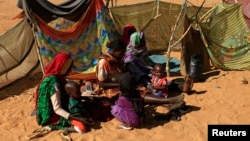The United Nations warned Wednesday that at least 78,000 more Darfuris have been displaced this year, as the government of Sudan pursues the second phase of a military offensive to crush rebels in the Darfur region.
U.N. Deputy Peacekeeping Chief Edmond Mulet reported the number of newly displaced people, as estimated by humanitarian organizations, to the Security Council.
In addition to that group, he said, the U.N.’s office for humanitarian affairs has received reports that there could be as many as 130,000 more displaced persons, most in the Jebel Marra area, where the heaviest fighting has been taking place. Efforts are being made to verify those numbers, but the area in Central Darfur is mostly cut off from aid workers and peacekeepers.
Mulet said attacks against peacekeepers and humanitarian workers were putting up obstacles to helping refugees. But he said U.N. peacekeepers had stopped attacks against civilians by setting up protective areas and also had conducted robust patrols in villages.
The latest hostilities come as the United Nations and African Union are working with Khartoum to negotiate a gradual exit strategy for their joint peacekeeping mission, known as UNAMID.
Mulet told the council that UNAMID’s proposed exit strategy "is based on the achievement of the mission’s benchmarks, as endorsed by this council last year, and premised on a political solution to the conflict based on direct talks between the parties, starting with a cessation of hostilities.”
He said there would be a gradual drawdown of peacekeepers in West Darfur, where there have not been any major activities by armed groups or intercommunal fighting for two years. UNAMID would also close three other team sites in North and South Darfur.
The U.N. also noted that the mission had collected evidence of cluster bomb use in North Darfur, which is prohibited under international law.
Sudan’s deputy ambassador, Hassan Hamid Hassan, rejected the grim picture the U.N. painted of a deteriorating security situation in central Darfur, saying the government was responding to a threat by the rebel group JEM, which had entered the country from South Sudan.
He added that much of Darfur’s violence is tribal in nature, and that the international community could best resolve it by lifting sanctions and canceling Khartoum’s debt.
UNAMID, in place since 2008, has more than 16,000 soldiers and police and costs $1 billion a year to run. Its relationship with Sudan’s government has been fraught with difficulties, including attacks on peacekeepers and constraints on their movements. The mission is often criticized for its ineffectiveness.
Relations are not helped by the fact that President Omar Hassan al-Bashir, who recently won re-election, has been indicted by the International Criminal Court and is wanted on charges that include genocide.
Darfur rebels took up arms against the Sudanese government in 2003. The United Nations says the conflict has killed 300,000 people and displaced 3 million more. Sudan puts the death toll much lower, at around 10,000.




